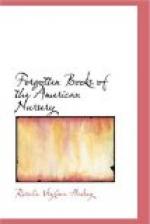Other boys, such as John Quincy Adams, had tutors at home as a less expensive means of education than the wartime price of forty dollars a week for each child that good boarding-schools demanded. But at their homes the children had plenty of opportunity to show their intense enthusiasm for the cause of liberty. Years later, Mr. Adams wrote to a Quaker friend:
“For the space of twelve months my mother with her infant children dwelt, liable every hour of the day and of the night to be butchered in cold blood, or taken and carried to Boston as hostages. My mother lived in uninterrupted danger of being consumed with them all in a conflagration kindled by a torch in the same hands which on the Seventeenth of June [1775] lighted the fires of Charlestown."[94-B]
He was, of course, only one of many boys who saw from some height near their homes the signs of battle, the fires of the enemy’s camps, the smoke rising from some farm fired by the British, or burned by its owner to prevent their occupation of it. With hearts made to beat quickly by the news that filtered through the lines, and heads made old by the responsibility thrust upon them,—in the absence of fathers and older brothers,—such boys as John Quincy Adams saw active service in the capacity of post-riders bearing in their several districts the anxiously awaited tidings from Congress or battlefield.
Fortunate indeed were the families whose homes were not disturbed by the military operations. From Boston, New York, and Philadelphia, families were sent hastily to the country until the progress of the war made it possible to return to such comforts as had not been destroyed by the British soldiers. The “Memoirs of Eliza Morton,” afterward Mrs. Josiah Quincy, but a child eight years of age in seventeen hundred and seventy-six, gives a realistic account of the life of such Whig refugees. Upon the occupation of New York by the British, her father, a merchant of wealth, as riches were then reckoned, was obliged to burn his warehouse to save it from English hands. Mr. Morton then gathered together in the little country village of Basking Ridge, seven miles from Morristown, New Jersey, such of his possessions as could be hastily transported from the city. Among the books saved in this way were the works of Thurston, Thomson, Lyttleton, and Goldsmith, and for the children’s benefit, “Dodsley’s Collection of Poems,” and “Pilgrim’s Progress.” “This,” wrote Mrs. Quincy, “was a great favorite; Mr. Greatheart was in my opinion a hero, well able to help us all on our way.” During the exile from New York, as Eliza Morton grew up, she read all these books, and years afterward told her grandchildren that while she admired the works of Thurston, Thomson, and Lyttleton, “those of Goldsmith were my chief delight. When my reading became afterward more extensive I instinctively disliked the extravagant fiction which often injures the youthful mind.”




